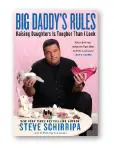When a new father gets to talk to tough-guy Steve Schirripa (of ‘Sopranos’ fame) about the prospect of raising two daughters, he finds wisdom and tenderness not far below the surface.
 Steve Schirripa is known for his tough-guy roles in films and television shows like The Sopranos and Casino, and as “Leo,” the father on the hit ABC Family show The Secret Life of the American Teenager.In his hilarious new book “Big Daddy’s Rules: Raising Daughters Is Tougher Than I Look” (co-authored by Philip Lerman; Touchstone/Simon & Schuster), Schirripa recounts his adventures as the father of two daughters, Bria (now 21) and Ciara (now 17) in New York City.
Steve Schirripa is known for his tough-guy roles in films and television shows like The Sopranos and Casino, and as “Leo,” the father on the hit ABC Family show The Secret Life of the American Teenager.In his hilarious new book “Big Daddy’s Rules: Raising Daughters Is Tougher Than I Look” (co-authored by Philip Lerman; Touchstone/Simon & Schuster), Schirripa recounts his adventures as the father of two daughters, Bria (now 21) and Ciara (now 17) in New York City.
There’s a laugh on every page of the book, and cameo appearances by Schirripa’s friends and fellow fathers Anson Williams and Joe Piscopo. Like some of his characters, it’s clear that when Schirripa is provoked or angry, he has all the temper (and the grace) of an enraged grizzly bear—but there’s a lot of tenderness and respect in there, too. Underneath all the fun and bravado is one enduring, inviolable rule for all parents, whether fathers or mothers: “Suck it up. Be there. Because you only get one shot at this.”
George Hunka: When I learned my wife was pregnant, I went to the bookstore and saw that there must have been 20 shelves full of books about raising kids. How is your book different from all the others?
Steve Schirripa: Well, Big Daddy’s Rules isn’t a book of advice—I’m not telling people how to raise their kids. The book is really a love letter to my daughters. I don’t always express myself the proper way. I’m a yeller, a screamer. But I don’t know how other people should raise their children. So far I’ve done all right, that’s all.
GH: I’ve heard of Tiger Moms. But what’s a “Big Daddy”?
|
|
SS: A Big Daddy has a big mouth, a big temper—and a big heart. His first rule is, “I make the rules.” But really, it’s about being someone who’s there for his kids, who’s present, all the time. [My kids] learn they can rely on me. And that way, even when I’m not with them, I’m present. When I’m not with them, they can ask themselves, “Should I be doing this? Would my mom and dad approve of this?”
GH: In the book you talk about some parents who complain, often, about needing their own time alone, away from the children.
SS: I don’t understand these parents. First you want the kids, then you have the kids, then you don’t want the kids. Now, I’m not knocking summer camp, but these parents send them off to camp all summer, then they’re in school for the rest of the year. When do you see them? The fact is, I like being with my kids. I like my kids—though I don’t like all kids.
GH: You were born in Bensonhurst, and you raised your daughters here in Manhattan. Are there special challenges to being a Big Daddy in NYC?
SS: Not really. It’s a pretty tough world wherever you are. And it’s hard to be a Big Daddy anywhere. It’s a full time job. It’s your number-one, number-two, and number-three priority. It doesn’t matter where you are.
GH: What do you think are the biggest differences between raising a girl and raising a boy?
SS: Boys are a little easier to deal with—maybe I’m wrong, but give them a ball or a game to play, they’re fascinated. Girls are smart, cunning, and manipulative. And that’s really a great thing, but you have to stay on top of it. I’ve always been happy with my girls.
GH: I had to deal with bullies growing up—and you did too—but they were all boys. How does a Big Daddy handle the prospect of bullying?
SS: Oh, you gotta be all over it. My older daughter got bullied on Facebook. Now I get a little overprotective—a little crazy, maybe (it’s part of being a Big Daddy)—so I called the NYPD. It turns out they have a whole unit that deals with cyber-bullying. “We’ll go and pay a visit to the house,” they said. I didn’t think we had to go that far—yet. So I said, “Let me call the dad.” And I did, and he couldn’t have been more responsive.
GH: Well, you’re a big guy.
SS: Yeah. But bullying has been going on forever. You have to get on it. You have to go right to the school and talk to the teacher. They’re with those kids the most, it’s their responsibility. And in the last resort, you go and visit the father.
GH: Is that another way of being “present” for your children?
SS: Sure. You have to be open with your kids—you have to keep your eyes open. I’m always asking them, “Is everything all right? Are you okay?” And I always told them to have a lot of friends, a wide variety of friends, so they don’t feel alone.
GH: Does being a Big Daddy get harder as girls get older?
SS: It doesn’t get easier. But I’ve applied the same rules whether they’re 4 or 14. I want them to be good people, to be safe, to be respectful. That’s what I want.
GH: In the book you ask: “Will they carry a little bit of their dad’s values with them as they grow up, and maybe even pass them on to their own kids?”
SS: Like I said, I want them to be good people, I want them to be safe. I really don’t care if they’re the best athlete, or the smartest kid in school. That doesn’t matter to me. Another thing that I want them to learn is that nothing comes easy, ever. It’s common sense, but you get out of something what you put into it. One of my daughters loved softball, she practiced all the time and got really good at it. My other daughter played basketball, but she didn’t like to practice and so she didn’t get really good at it. But how’re you gonna get better if you don’t put the work and the time in?
GH: Maybe when your daughters have their own children they’ll remember your book and become “Big Mommies” themselves.
SS: “Big Mommies”! I like that!






















